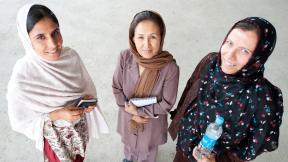
Shaheen gets her first paycheck from waitressing and spends it all on new clothes. She has none left over even to pay for gas in the car, let alone a bus fare to work the next week.
Ahmed receives hundreds of dollars as a high school graduation gift and within two weeks, it's all gone: treating friends to lunch, going to arcades and a new guitar.
These fictional scenarios are sadly not always fiction.
Young adults, teenagers, let alone most kids in our culture are not taught how to earn and spend their money properly. Many are taught, through a steady diet of commercials and cartoons to rush into buying the latest toys, cereal, clothes. As they age, kids' tastes become more expensive. Few are taught the art of managing money carefully.
For Muslims, this is even more important. Our wealth, be it in the tens, twenties, hundreds or thousands is a trust and a test for us. We will be accountable to Allah for how we have earned and spent it. We have to learn the habits of highly effective money management and pass it on to our kids.
We want our kids to be responsible, debt-free and most importantly Haram-free in how they take care of finances.
But how? Here are some tips to help you get started:
1. Find out the boundaries of Halal and Haram on money issues
How many "religious" Muslims do you know who pray, fast, dress and talk Islamically, but collect and take interest on loans for cars, school, etc? Sadly, it's all too common.
The key is knowledge. Get a couple of good books that are simple, straightforward and provide the Islamic perspective on earning and spending money.Also, consult a knowledgeable Imam or Shaikh and get the basics straight. If you want to transmit the boundaries of Halal and Haram in this area to your kids, it must be clear to you first.
This knowledge should also go into encouraging your kids to pursue Halal careers. Try to steer them away from areas like real estate, for example, which involves getting people to buy homes almost always involving interest or waitressing where women are usually required to compromise their modesty for providing service.
By catching this interest in a given profession early on, you can start talking about what is Halal. If they are interested in something that is not Halal, there is still time to guide them in the right direction.
2. Adjust your lifestyle to ensure that you are living by the rules
Simply put: practice what you preach. Make concrete changes. For example, if you discover the profession that you have been supporting your family with is not compatible with Islamic values, make Dua and make the change. If you notice you tend to spend on useless items, work on curbing the habit. The more sincere your commitment and the more you work at it, the more you will provide a solid role model of Islamic financial success to your kids.
3. Give them an allowance
Parents too often think they should have complete control over all aspects of their kids monetary needs. But giving a weekly or bimonthly allowance, (which varies according to their age level) is a very important tool for them to learn proper money management. They can't do it simply by being lectured about Haram and Halal in the financial aspect of their lives. They have to do it, make mistakes at times, and learn from them. Give them an allowance.
4. Help them make a "money chart"
This would be Jehan or Amin's "personal budget". Let them decorate it and check it weekly with them. This will develop a habit of keeping track of money. This is also a time to discuss what purchases and expenses were worth it, which ones not and why.
5. Make a list of things they cannot spend on
To encourage spending on what is Halal include a list of "no-no items" on everybody's money chart. This can include rock music CDs and cassettes, certain kinds of magazines and videos, certain types of candy or junk food (which are not Halal because of food ingredients), etc. This will encourage kids to think from an Islamic perspective about what they are spending on.
6. Have them make a "savings box"
Have Muhsin and Muminah take an old Kleenex box, decorate it, and tell them they must put a certain amount of their allowance every time they get it in this box. They must do this right away, when they receive their allowance. This will encourage the habit of saving.
7. Require them to give Sadaqa on Fridays
Teaching kids generosity and the importance of charity is crucial and this can only really have an impact on them when they themselves begin giving. Make it a requirement to fix a certain amount for Sadaqa in their allowances at least on Friday. They can put it in the Masjid if they go for Juma, or they can put it in the family Masjid.
8. Have a "secret Sadaqa box"
This is to encourage secret charity. Put it in your house Masjid, make it clear why it's there and tell the kids the rule is no one can give in this box when other people can see them. Decide as a family where the money should be given.
9. Before Islamic fundraising dinners, remind them to save and give a special portion
A week before the next big fundraising dinner, have a family meeting and discuss it. Don't be so rigid that your kids feel forced to give. Rather talk about the merits of the fundraising project and why it is important for Muslims to support it. Then leave the decision to them. This will make them feel they are really making the choice to give Sadaqa.
10. Take them "smart shopping"
To teach Jafar or Amal the value of buying wisely, not on impulse, don't just not take them to "danger zones" (i.e. toy stores) so they will make no demands. Instead, before you go to such places, talk to them and set a budget. Say you're willing to buy them a new doll or jacket, but this (i.e. $20.00) is the highest they are allowed to spend. Then give them the responsibility of finding what they like in this budget range. This will teach your kids to buy and spend in moderation.
11. Raise the Sadaqa requirement for teens
15-year-old Sumayya or 14 year old Tareq have to be spending more on Sadaqa than five year old Amin. Do this gently though. Explain that while they now have a bigger allowance, they also have a bigger responsibility to spend on what's right, and this includes charity.
12. Make teens pay for one household need
This does not have to be a big item like furniture or home repairs. It can be simply pitching in for the family grocery bill. But even better, give them one specific responsibility and have them cover some of its expenses. For example, if Hassan is in charge of mowing the lawn, that means he has to maintain the upkeep of the lawn mower. This might involve the need to spend on oil for it, or some repairs on the lawn mower (if they are not really expensive). Doing this will make your teen feel this job is "theirs" and they will, Insha Allah, develop a higher sense of responsibility.
13. Use the right role models to explain
How would Abdur-Rahman ibn Awf or Abu Bakr have spent those $60? I'm pretty sure not on rock videos. Use the Sahaba as examples of good Islamic monetary spending in discussions and family meetings or if an issue of this nature comes up.
14. Have the family sponsor an orphan
Or some other collective Sadaqa project. Pitching in together as a family will help you bond and you'll be doing good not just as individuals but as a family.
15. Encourage spending in Ramadan
Before Ramadan, mention during a family meeting, the special importance of giving in this blessed month. Remind them they will receive a higher reward for good deeds, and maybe even have them raise their weekly Sadaqa level starting Ramadan.
16. Support Halal businesses and discuss with kids why Halal
If Uncle Mateen from the local Halal grocery store sells not only Halal meat, but also rents Islamic books and videos instead of Hollywood and Bollywood movies, support this business. Take the family or one of the kids every couple of weeks to show what a Halal business is really supposed to be like. As well, explain why this is a Halal business as opposed to others and encourage the kids to buy something, even small (i.e. Miswak toothpaste) to make their contribution to this business.
17. Encourage them to work towards a long term goal (delayed gratification)
If they want something, discuss the option-a candy bar now, or a skateboard later. For older kids, talk about how the pleasure from that purple sweater or that new video game they have is fleeting. Encourage them to think long-term and save for what they really want-i.e college education, new car (all without interest).
18. Discuss changes in family meetings
Be open about financial changes in the family. If there is a job loss, or a promotion, these should be openly discussed: how can expenses be covered after the loss of income; or does Daddy's promotion mean a new house, car or supporting an orphan from Kosova?
19. Teach the importance of loans and debts
To prove a point, borrow a certain amount of money from Samina (i.e. $5.00), tell her when you will pay her back and do it at this time. This will teach her the importance of paying back loans and not being in debt.
20. Make Dua
Changes in your financial life but always remember Allah is in control. He is your Guide and Helper. Make sincere Dua that He help you avoid Haram forms of income and expenditure as much as possible and that He help you and your kids maintain Islamic financial habits.










Add new comment